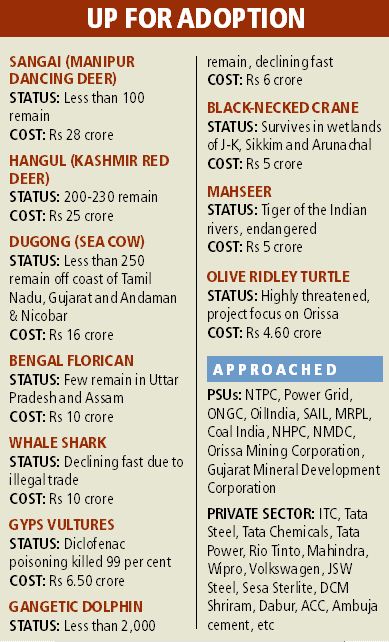The Indian Express, 4 April, 2015
Snow leopards for Rs 35 crore, gharials for Rs 80 crore, whale sharks for Rs 10 crore and black-necked cranes for Rs 5 crore — these are among 14 endangered species put up for corporate sponsorship by the Ministry of Environment and Forests. Between great Indian bustards going for Rs 104.5 crore and olive ridley turtles for a meagre Rs 4.60 crore, the total conservation cost of these species over the next five years is pegged at Rs 400 crore.
Under the scheme — Developing partnerships and funding conservation initiatives under Corporate Social Responsibility — piloted by the Wildlife Institute of India (WII), supporting “highly endangered wildlife species and their habitats will not only help corporate groups compensate for their ecological footprints but would also provide them reputational benefits”.
WII director Dr V B Mathur says Oil and Natural Gas Corporation (ONGC) has already shown interest in adopting the snow leopard, while both Power Grid Corporation of India and Gujarat Mineral Development Corporation are eyeing the most expensive buy, the bustard. In sync with its attachment to rivers, the National Hydroelectric Power Corporation is considering the prospect of investing in the Gangetic dolphin.
The move preceded this year’s cut in budgetary allocation for the ministry’s Integrated Development of Wildlife Habitat (IDWH) scheme under which the country’s 600-odd national parks and sanctuaries — all except tiger reserves — and 16 endangered species are looked after. As the ministry’s budget was slashed by 25 per cent to Rs 1,681 crore, the already meagre allocation for IDWH dipped to just Rs 61.5 crore.
Earlier, Rs 800 crore was earmarked for IDWH under the 11th Plan, but less than half the amount was released during the Plan period. The ministry demanded a four-fold hike under the 12th Plan but was turned down.
“With operating budgets… always being limited”, the ministry and the WII sensed an opportunity when the government notified Corporate Social Responsibility (CSR) guidelines in April 2014, identifying “environmental sustainability” as one of the activities to be covered under it.
Eleven PSUs were approached last August, and in February, MoEF secretary Ashok Lavasa wrote to 19 member companies — including Tata, ITC, Rio Tinto, Sesa Sterlite and Wipro — of the India Business & Biodiversity Initiative (IBBI), launched by the CII-ITC Centre of Excellence for Sustainable Development.
The response, however, has been lukewarm. Since last August, only four PSUs have shown some initiative. When contacted, officials at ONGC, the PSU apparently keen to adopt the snow leopard, refused to go on record as “nothing has been finalised yet”.
“We have sent the proposal for snow leopard to ONGC only last week. It is not easy to convince companies to look beyond the traditional CSR fundings in health and education sectors. These are very small amounts as the total CSR budget runs into thousands of crores in India,” said Dr Mathur, one of the brains behind the scheme.
It was Lavasa, claim sources, who expanded the reach of the scheme from PSUs to private companies. “The ministry decides on clearances and the WII is often involved in the evaluation process. So approaching the private sector for funds could be construed as a conflict of interest. We decided to go through IBBI, a platform we created with the CII,” explained a senior MoEF official who did not wish to be named.
Besides species conservation, the scheme also seeks Rs 40 crore for an advanced forensic lab and Rs 15 crore to strengthen India’s research capacity in Antarctica. Already, there are proposals to add more species — such as the Indian saras and the wild buffalo — to the scheme.
“We can always expand the list depending on the response. This initiative is not about covering any specific shortfall. Though the central allocation has come down this year, one expects the states to put in an equal amount. Conservation needs all the support it can get,” said Dr S K Khanduri, IGF-wildlife.




No comments:
Post a Comment